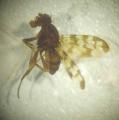Diptera.info :: Family forums :: Syrphidae
|
Assistance required re Xanthogramma determination
|
|
| conopid |
Posted on 23-10-2009 10:42
|
|
Member Location: United Kingdom Posts: 1039 Joined: 02.07.04 |
Dear forum, I have a British specimen of Xanthogramma, which I believe is X stackelbergi. I have concluded this from the English keys and key-facts in the Encyclopedia of the Swedish Fauna & Flora series - TvŚvingar: Blomflugor. I am fairly confident that my specimen is X stackelbergi, but I need to get this validated. If this is indeed X. stackelbergi, it would be new to Great Britain. Two questions: 1. There may be further information that can further clarify my determination, contained in the more extensive Swedish text. Is there anyone able and willing to translate the text, in the above volume, about X stackelbergi from Swedish to English for me? It's about 2-300 words I guess. 2. Is there anyone I can send the specimen to, who has access to specimens of X stackelbergi, that they can compare my specimen to? Nigel Jones, Shrewsbury, United Kingdom |
|
|
|
| JariF |
Posted on 23-10-2009 11:07
|
|
Member Location: Helsinki, Finland Posts: 2072 Joined: 20.01.06 |
Hi, maybe this will help http://www.tam.pp.fi/syrph/key_Xanthogramma.pdf Jari |
|
|
|
| Andre |
Posted on 23-10-2009 11:29
|
|
Member Location: Tilburg, the Netherlands Posts: 2111 Joined: 18.07.04 |
The status of stackelbergi versus dives is not cleared yet. There is still much confusion and overlap of characters. Dieter may be the person you can send your specimen to. I have myself a whole series of specimens that seem to belong to stackelbergi/dives, most of which are southwesteuropean catches. |
| conopid |
Posted on 23-10-2009 11:41
|
|
Member Location: United Kingdom Posts: 1039 Joined: 02.07.04 |
Jari and Andre thanks for your quick and helpful responses. I'll contact Dieter to see if he can help further. From what Andre says, it appears that definitive determination will be difficult. However, whether the specimen is stackelbergi or dives, it would still be new to Great Britain. But it looks like it may not be possible to determine the species accurately? Edited by conopid on 23-10-2009 11:49 Nigel Jones, Shrewsbury, United Kingdom |
|
|
|
| Andre |
Posted on 23-10-2009 12:55
|
|
Member Location: Tilburg, the Netherlands Posts: 2111 Joined: 18.07.04 |
From Syrph the Net, volume 2008: Xanthogramma dives (Rondani), 1857 Range: at present uncertain, due to confusion with related species, but known from Spain, southern France (to as far north as the Paris basin), central Germany and northern Italy. The name dives (Rondani) appears in Peck (1988) as a synonym of X.pedissequum. Its use here is based on unpublished information received from Kassebeer (pers.comm.). Whether or no the correct name to use for this taxon is dives Rondani could only be confirmed by examination of the type material of dives. There are no clear differences between the concept of X.dives as applied here and X.stackelbergi, to judge from the rather inadequate information available about X.stackelbergi in existing literature. But, for now, the name dives is used here to draw attention to the existence of this taxon and to enable its separation from X.pedissequum. Xanthogramma pedissequum (Harris), 1780 Range: uncertain, due to confusion with related species, but from from Britain and Atlantic seabord countries south to the Paris basin and into central Europe to the Alps (France, Switzerland). Determination: This species is included in various keys e.g. van Veen (2004), none of which can, however, be used to separate this species from X.dives. The adult insect is illustrated in colour by Colyer and Hammond (1951), Haarto and Kerppola (2007), Kormann, Stubbs and Falk (1983), Torp (1984, 1994) and van der Goot (1986). Xanthogramma stackelbergi Violovitsh, 1975 Determination: the description of this species is based on a solitary male from the St Petersburg region of European Russia. The female remains undescribed. X.stackelbergi is included in the keys provided by Violovitsh (1975), who also figures the male terminalia. From the information provided by Violovitsh (1975) there would be no reliable way of separating this species from the taxon referred to in the present text as X.dives. |
| conopid |
Posted on 23-10-2009 13:44
|
|
Member Location: United Kingdom Posts: 1039 Joined: 02.07.04 |
many thanks for this Andre. It's very helpful. I looked at Syrph the net website, but failed to find this data. What's the link for these pages? For now it looks like separating the species is a lost cause! It's interesting that Finnish and Swedish authors treat X stackelbergi as a species that can be determined without complication. I guess I'll have to treat mine as Xanthogramma dives/stackelbergi - indeterminate. Nigel Jones, Shrewsbury, United Kingdom |
|
|
|
| blowave |
Posted on 23-10-2009 14:30
|
|
Member Location: LINCOLN, UK Posts: 3151 Joined: 27.06.07 |
I googled and found this, might be of some help but from a different author. http://docs.googl..._aJX1bUcQg Janet  |
| blowave |
Posted on 23-10-2009 14:42
|
|
Member Location: LINCOLN, UK Posts: 3151 Joined: 27.06.07 |
It's mentioned on this pdf, in a family tree further down but there's a lot to read so it might get a mention elsewhere.. http://entomology...istics.pdf HTML form.. http://74.125.155.132/scholar?q=cache:q-Bpa960PIgJ  cholar.google.com/+Xanthogramma+stackelbergi&hl=en cholar.google.com/+Xanthogramma+stackelbergi&hl=en |
| conopid |
Posted on 23-10-2009 15:34
|
|
Member Location: United Kingdom Posts: 1039 Joined: 02.07.04 |
Thanks Blowave. I'll read this.
Nigel Jones, Shrewsbury, United Kingdom |
|
|
|
| Andre |
Posted on 24-10-2009 22:48
|
|
Member Location: Tilburg, the Netherlands Posts: 2111 Joined: 18.07.04 |
I can send you the pdf's if you send me your emailaddress  |
| Jump to Forum: |













